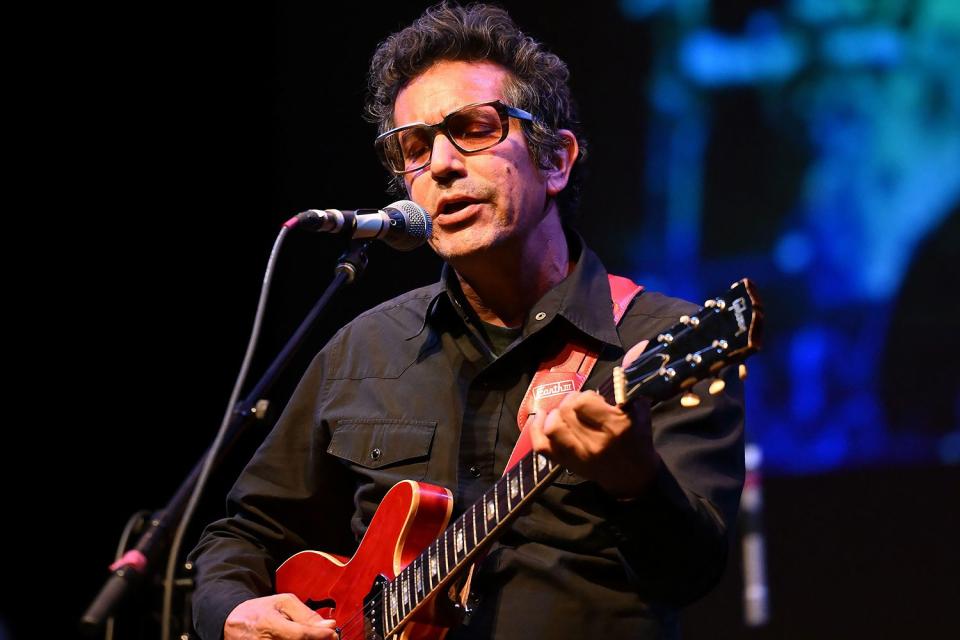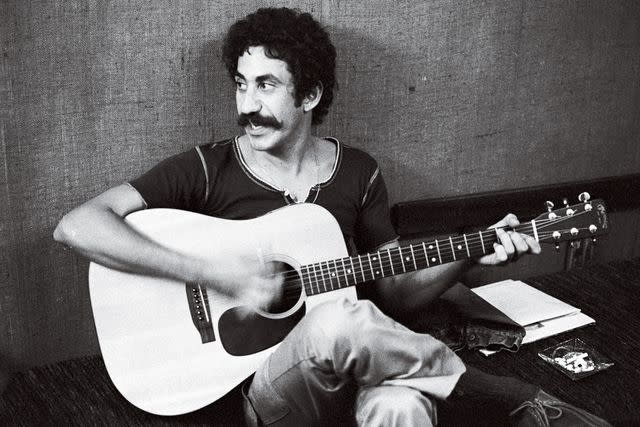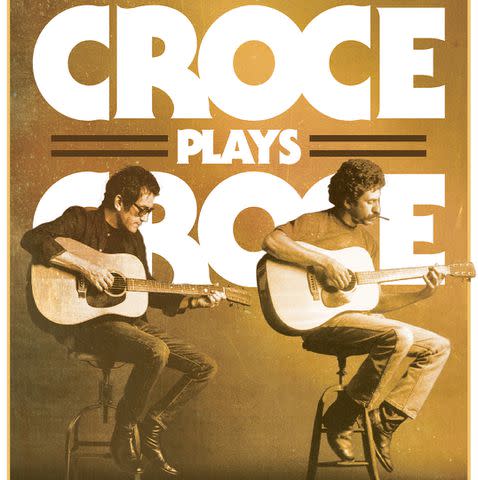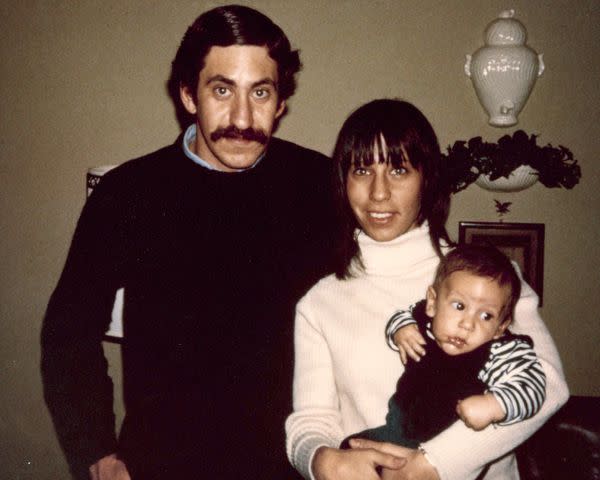A.J. Croce Talks Connecting with Singer Dad Jim's Legacy 50 Years After Fatal Plane Crash (Exclusive)
The 52-year-old is connecting with the father he barely knew by reviving songs like "Operator" and "Bad, Bad Leroy Brown" on the Croce Plays Croce tour

Jeff Moore/ZUMA Press Wire
A.J. Croce performing in November 2023Jim Croce was bound for his next concert when he boarded a chartered plane in Natchitoches, Louisiana, on Sept. 20, 1973. But in his own mind, he’d already arrived. After spending the better part of a decade driving trucks and taking construction jobs to supplement a meager income playing Pennsylvania steakhouses and coffee shops, the singer-songwriter had notched three Top 10 songs in just 18 months — including the No. 1 hit “Bad, Bad Leroy Brown.” But the promising career of the 30-year-old blue collar troubadour came to a shocking end when his Beechcraft E18S crashed into a tree during takeoff, killing everyone aboard.
Four days later, Jim’s widow received a letter he mailed shortly before the fatal flight. It ended with a message to their son A.J., who turned 2 that week: “Give a kiss to my little man and tell him Daddy loves him. Remember, it’s the first 60 years that count, and I’ve got 30 more to go.”

Paul Wilson
Jim Croce portrait in 1972Half a century after this devastating loss, A.J. — now 52 and a virtuosic multi-instrumentalist — is touring the country with Croce Plays Croce: 50th Anniversary, a night of music and memories that blends his own songs with those of the dad he barely got to know.
“I’m celebrating the legacy of my father, but it’s really the legacy of two generations of musicians,” he says in the new issue of PEOPLE. “We share a love of storytelling and music. I'm not a cover band per se, though there are times when I sound a lot like my father — even though I'm 20-some years older than him at this point.”
The revolving setlist draws from the elder Croce’s three ‘70s LPs — You Don't Mess Around with Jim, Life and Times, and I Got a Name — which were re-released last year in a 50th anniversary set. “I play a different show each night," he says. "I always open it up to the audience to shout out what they want to hear. I didn’t want the show to be just nostalgia. I wanted it to be living, breathing and vital.”
Until recently, A.J. was reluctant to perform his father’s songs in public. “I've had the opportunity to do this my entire life,” he says. “I turned it down for 25 years because I just didn't feel there was integrity capitalizing on his music without making a mark of my own.” But four decades into his own career, he’s made it clear that he’s more than his famous surname. After cutting his teeth as a touring keyboardist when barely out of his teens (handpicked by the likes of B.B. King, Ray Charles. Aretha Franklin and James Brown) he released a string of critically acclaimed albums, sharing songwriting co-writes with R&B luminaries like Allen Toussaint and Leon Russell.
A turning point in A.J.’s relationship to his father’s music came in 2012, when he performed a handful of Jim’s classics at a party celebrating what would have been his 70th birthday. The crowd’s response was a transformative surprise. “I thought I was going to have an audience of people sitting with their arms crossed like a classical critic, studying every note and seeing if I played it exactly like my father," A.J. says. "But I discovered it was the opposite. I had the joy of being able to both connect with something that meant so much to people, and at the same time make it completely alive and new.”
Music has always been a part of A.J.’s life. His earliest memories involve crawling around the legs of the family piano. “I can't remember a day without music,” he says. It helped him cope with both the death of his father and another early tragedy. When A.J. was 4, he went blind — the result, he claims, of physical abuse from his mother’s then-boyfriend. (He regained vision in one eye as a 10-year-old.) Before long he’d blossomed into a piano prodigy, writing songs while most his age were struggling to write words, and spending upwards of eight hours a day at the keys.
“I was inspired by Ray Charles and Stevie Wonder — they were huge for me. Those albums were a part of my father's record collection. When I lost my sight, a family friend pulled them out and said, ‘These might be inspiring.’ So it was through my challenges, and with the help of others, that I was really able to discover music. Then I was able to discover so much more that was part of my dad’s record collection — the old blues, jazz, rock & roll and soul music.”
Most of this record collection was lost, along with most other mementos, following a fire at the family home when A.J. was a teenager. But they did manage to salvage one of Jim’s guitars, a 1933 Gibson L-00 on which he’d written many of his greatest songs — including his posthumous No. 1, “Time in a Bottle,” written the day he learned he was going to be a father. The instrument remains a treasured possession for A.J. “It inspired me to learn guitar,” he says. “I'm left handed, but I learned to play guitar right handed because of that guitar. To me, it's one of the most beautiful sounding instruments.”

The musical bond between father and son was strengthened recently when A.J. came across a homemade tape Jim recorded performing obscure blues and folk tunes. “There were deep cuts of Bessie Smith, Pink Anderson, Mississippi John Hurt, and Skip James. Old Blues, old country. Every song that he played was a song I had been playing since I was a teen, but I’d never heard him play them!”
The effect was almost supernatural, like a message from beyond. “It made the hair on my neck stand up. This wasn't stuff that was in his collection. Most of it I found on my own. That was a huge moment for me. I realized we had a connection that was deeper than just DNA. You recognize something in your parents that you carry, though is not scientifically explainable.”
He incorporated some of these covers into the setlist for Croce Plays Croce, sprinkling them amongst his own songs and those of his father. For A.J., performing Jim’s beloved hits means more than just playing to the crowd — it helps him heal. Each track is a fragment that allows him to piece together a complete portrait of his father as a man and as an artist. “When you look at his catalog of songs, you’re looking at snapshots in his life,” he says. “They gave me a better sense of who he was.”
Rounding out the family affair is A.J.’s mother Ingrid, who occasionally joins him onstage. Though speech aphasia has rendered her unable to talk, her singing remains unaffected and she frequently chimes in for an encore. “It's one of the cool ways that we're able to communicate now,” he says. “She co-wrote ‘Hey Tomorrow,’ which was on my dad's first album, You Don't Mess Around with Jim. So we’ve had her join us on that and sing the original harmony on it, which was really cool. I kind of save that song for when she's there. But whatever she wants to do, I'm happy to have her.”

Courtesy of A.J. Croce
Jim Croce with wife, Ingrid, and son, AJ, Christmas 1971The emotional centerpiece of the evening, 1972’s “Photographs and Memories” (“All that I have are these to remember you…”), is made extra poignant by the childhood snapshots and home movies projected above the stage. But rather than end on a tearjerker, A.J.'s ever-shifting song list always has the same closer: “I Got a Name.” Released the day after Jim’s death, it seemed custom-made for the moment. “I got a name, and I carry it with me like my Daddy did,” A.J. sings. It’s a voice 20 years older than the man who made it a hit. And it’s a voice brimming with pride.
“People are so emotional hearing the music and stories,” he says. “I had avoided performing my father's songs [because] I thought that he was really the only person that could perform them. And in some ways I still feel that. But I can tell you that people come to see the tour as Jim Croce fans and they leave as fans of mine. I could never have imagined — and I would never have had the ego to expect — that by performing these shows I would have more fans of my music. It's really very special. I feel incredibly lucky.”
For more People news, make sure to sign up for our newsletter!
Read the original article on People.


